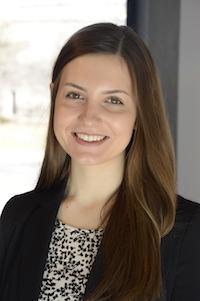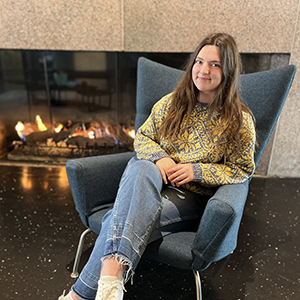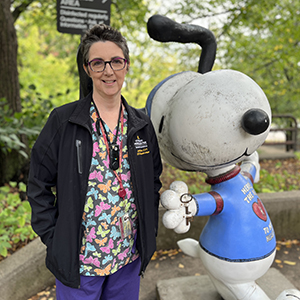Anne Belde
Anne Belde knew she wanted to work in health care, and at first blush she figured nursing was meant for her. But then in 2015, a new health care major at the U of M emerged: the Health Services Management (HSM) program.
“I really liked working in long-term care as a nursing assistant,” Belde says. “But it was all about maintaining health, and I was more interested in improving health care. The HSM program really focuses on the latter.”
Enrolling in the HSM program for Belde meant widening her perspective to look at the health care industry at large, searching for ways to begin the improvement work she was drawn to. One big way that all students in the HSM program initiate that important work is through an internship.
Internships happen all over the Twin Cities metro area and cover a wide range of topics, from health insurance to hospital operations to nursing home administration, just to name a few. For Belde, her summer 2016 internship at HealthPartners meant digging into a variety of data to make important recommendations for improving care access in specialty care.
We sat down with Belde at the HealthPartners headquarters in Bloomington to ask a few questions about her internship experience.
Q&A with Anne Belde
CCAPS: When did you start your internship and what’s your official title?
AB: I started at HealthPartners on May 23rd, working full-time out of the corporate office in Bloomington. I’m a specialty care intern under Pam Zoeller, who is the Vice President of Specialty Care and Clinic Operations and who sits on the advisory board for the Health Services Management major.
CCAPS: That sounds like an important job. What do you do on a day-to-day basis at your internship?
AB: Each day has been different and exciting. I’ve attended meetings with my mentor, I’ve spent time working on the six different projects I have been involved in, as well as visiting multiple HealthPartners locations such as Regions Hospital, the HealthPartners Specialty Centers and HealthPartners Riverside Clinic. These experiences really helped me to understand various aspects of operations at a large health care organization like HealthPartners.
CCAPS: What are we talking about exactly with “access”? What’s the issue you’re working on?
AB: HealthPartners has created efficient processes for physicians to refer patients to other physicians within their system. Physicians see the value in this, yet we are faced with access challenges limiting this care coordination. Having an access problem is not a bad problem to have: we just have to find ways to better understand and work with the patient demand we are experiencing.
A number of my projects touched on various aspects of access, such as physician schedules and phone access. We’re constantly trying to improve how quickly and efficiently patients receive care.
For my internship, I started out looking at phone access, studying how many new patients were calling and being offered appointments within two weeks and how many were scheduled within two weeks—all the while trying to understand what patients experience as they navigate the system.
I also worked on an oncology project which focused on our access goal of average wait days and tried to figure out what patients were being seen for beyond our access goal. I took a large spreadsheet of wait days for oncology and hematology data and compressed it into average wait days for oncology patients, which represented a broad range of wait days. I found that more than half of patients in my sample were breast cancer patients who were scheduled for their oncologist appointment after surgery or pathology. For that reason, oncology access looked worse than what it was in reality. We will be working to show this distinction to accurately measure oncology access in the future.
There’s no single method to fix access; we’re looking at several different components in the access work.
CCAPS: Really interesting. Did you experience anything on the internship that you learned about in your HSM courses?
AB: I attended a board meeting at Region’s and heard about the challenges health care professionals are facing today, which include a lot of the topics we discuss in the HSM program such as staffing, budgeting, quality of care and federal regulations. To see how these topics actually apply to a large hospital like Regions was very eye-opening. When you’re here, you see what’s really facing health care leaders. The HSM program also focuses on building team collaboration which is vital in health care organizations.
CCAPS: That’s great. What other projects did you work on over the course of your internship?
AB: I did an audit of physician templates to understand how specialty physicians were doing in our access measure of having schedules open for scheduling 13 months in advance. I shared this audit with leaders to bring awareness of our goal and to understand challenges to meeting this goal in certain specialties. One month after the audit, 12 physician templates were extended to meet this goal.
Additionally, I spent 12 hours in our Appointment Center, listening in on calls and recording first contact resolution versus first call resolution. My challenge was to identify what barriers there are to phone access in the Appointment Center and at the clinic level and what we can do to minimize these barriers.
CCAPS: Wow, you covered a lot of ground. What was the big takeaway of this internship experience for you?
AB: HealthPartners is a very patient-centered organization that is continuously working to achieve the Triple Aim of improving the patient experience and population health while reducing health care costs. I have learned so much and acquired skills that will help me as I begin my career in health care management. Whatever direction I choose to go in, this internship will have helped me get there. Internships like this are so valuable and my experience this summer has been incredible. I know I’m in the right line of work.









